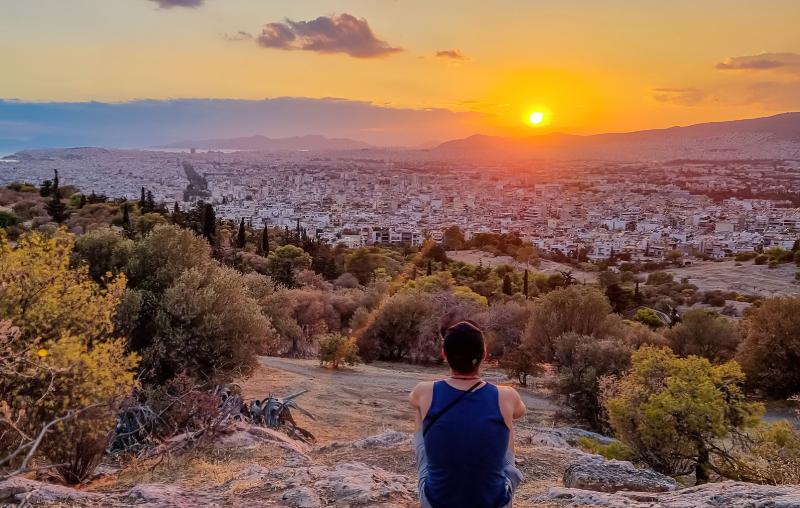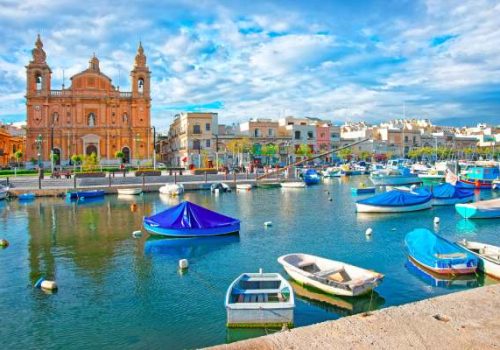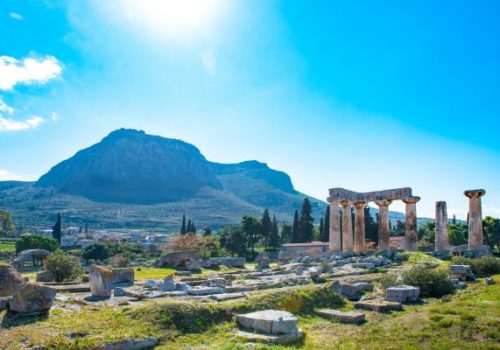Living and Working in Greece
Information & guidance about seasonal jobs in Greece
Greece (Ελλάδα)—officially known as the Hellenic Republic (Ελληνική Δημοκρατία)—enjoys a warm Mediterranean climate as the southernmost part of the Balkan Peninsula. Greece is also renowned for its unique culture.
The country shares its borders with Albania, North Macedonia, Bulgaria, and Turkey. Islands like Crete, Lesbos, and Rhodes are among the most popular. From the Aegean coves along the endless coastline to the Byzantine hiking trails, palm-fringed beaches, fossil-lit cliffs, and white villages perched on limestone rocks, Greece’s natural beauty is as rich as its Greek history.
From the arena where the first Olympic Games were played to the rocks leading to the monasteries of Metheora and the stars above the ancient open-air theatre, Greek history is truly remarkable, and living and working in Greece is an incredible experience.
Seasonal jobs in Greece
- Hotel jobs, Tourism
- Cyprus, Greece, Spain
- Adventure jobs, Hotel jobs, Tourism
- Bulgaria, Croatia, Egypt, Greece, Italy, Spain, Turkey
- Customer support
- Greece
Greece offers many jobs in it’s summer tourist industry and work can be found between May and September in hotels, bars, clubs and restaurants. Most vacancies are in the busier tourist areas and the Greek Islands of Corfu, Crete, Rhodes, Kos and Zante.
Au Pairs usually need some childcare experience but won’t always need to be able to speak Greek. Au pairs live with host families, looking after the children and perform basic domestic duties such as cleaning. Wages are often low but food and accommodation is usually included. Athens is a good place to look for this type of work.
Harvests throughout the year include oranges, bananas, potatoes, olives and grapes in a number of places including Toló, Argos, and Crete. Most harvest work can be found by enquiring in person to various farmers. The majority of jobs on farms will not pay very well and working hours can be long.
English teaching work is offered in private language schools throughout Greece, particularly in towns and cities such as Edessa, Larissa and Preveza in mainland Greece.
Voluntary Job Opportunities In Greece Include conservation work opportunities in Greece and the Greek Islands.
Working in Greece
Working Conditions in Greece
The Greek economy remains one of the least developed within the EU. Especially, the sectors of computer technology and electronics are not as advanced as in most other European countries. Inland areas emphasize the development of medium-sized cities (such as Patras, Volos, and in the north, Xanthi, Kavala, and Alexandroupolis).
While the number of vacation days you can take varies by company or institution, Greece has 14 national holidays. Furthermore, most companies follow a standard 5-day workweek, but working hours can vary significantly.
Salary in Greece
The average gross annual income for a Greek citizen is €22,800 euros. The minimum wage in Greece was €580 per month in 2002 and increased to €684 per month in 2018. As of May 1, 2022, the minimum wage has risen to €713 per month. With an eye on economic recovery, it’s likely that the minimum wage will continue to increase in the coming years.
Income Tax in Greece
There are three types of income tax in Greece: regular income tax, a special defense contribution, and a solidarity surcharge. Income tax rates range from 22% to 45%.
Income from salaries, pensions, and other sources is taxed at progressive rates, with the highest rate applying to incomes over €60,000. The first €8,600 of taxable annual income is exempt from taxation.
Special contributions for defense are levied on all taxable incomes at a rate of 4.5%. A solidarity surcharge of 1% is also imposed on incomes exceeding €12,000.
Various deductions and credits are available to lower your effective tax rate. These include deductions for health insurance, childcare, and alimony payments. You can also receive a tax credit for certain expenses, such as home mortgage interest or donations to charitable organizations.
Holidays in Greece
Greeks place great importance on Greek holidays. Below is an overview of all official holidays in Greece. On these days, most businesses, supermarkets, and government institutions are closed.
- New Year’s Day (January 1)
- Epiphany (January 6)
- Clean Monday (41 days before Easter)
- Independence Day (March 25)
- Good Friday
- Labor Day (May 1)
- Greek Orthodox Easter
- Greek Orthodox Easter Monday
- Whit Sunday (Pentecost)
- Whit Monday
- Assumption of Mary (August 15)
- Oxi Day (October 28)
- Christmas Day (December 25)
- Boxing Day (December 26)
Work Culture in Greece
When you work in Greece, it’s helpful to know a bit about the work culture. While there’s generally a relaxed atmosphere in the workplace, Greeks often work long hours, starting early in the morning and working late into the evening. Greeks, on average, work 42 hours a week. If you’re used to a 9-to-5 mentality, you may need to adjust in Greece.
Additionally, Greeks place a high value on family, friends, and building relationships. Lengthy coffee and lunch breaks on workdays are not uncommon in Greece.
Hierarchy in the Workplace
Greece is a hierarchical society, and this is reflected in the business world. There’s a strong hierarchical structure in most companies, and managers and bosses are highly respected for their experience and position. This is evident in how employees address their superiors. In Greece, it’s customary for people to use formal titles like “Mr.” or “Mrs.” when addressing their managers or bosses, even if they later refer to each other by their first names.
Working in Athens
Working in Athens is a valuable experience. As you learn about Greek culture and the history of Athens, you also enhance your international career. Moreover, there are various sectors to choose from. Some popular sectors for Dutch/Belgian professionals in Athens include tourism, hospitality, retail, healthcare, education, and technology.
Furthermore, many companies in Athens are regularly looking for customer service representatives and translators who are fluent in Dutch/Flemish.

Summer Jobs in Greece
Are you interested in doing summer jobs in Greece? It’s good to know that there are various options available. Many hotels and resorts hire employees from around the world to assist during their busy summer season. There are also several travel companies always on the lookout for new guides who are fluent in Dutch/Flemish. In short, there are various roles to choose from, including tour guide, hotel staff, and restaurant server.
Working in the Hospitality Industry in Greece
There are many different types of hospitality jobs available in Greece, especially during the summer season.
The most popular hospitality jobs in Greece are in hotels, restaurants, and tourism. A hotel job could include positions like a receptionist or hotel management. In a restaurant, you can work as a chef, waiter, or manager. Some examples of jobs in the tourism sector include being a tour guide, working at a travel agency, or promoting Greek products and services related to travel and tourism.
Keep in mind that working in the hospitality industry can be quite demanding. You should be willing to work long hours, including late evenings and weekends. However, having a job in hospitality can also be very rewarding as you get to meet people from all over the world.
Job Opportunities in Greece If you’re looking for a job in Greece, you’ll be pleased to hear that there are plenty of opportunities. In Greece, there are particularly many job openings for people who are multilingual. Aside from hospitality and tourism, the sectors of agriculture and industry are also crucial in Greece.
Moreover, there are numerous international companies based in Athens. These companies are constantly in search of new customer service representatives who can speak specific languages, including Dutch/Flemish, English, German, and French. If you want to explore Greek culture while learning more about customer service, Athens is the perfect city for you!
Finding a Job in Greece
The best way to find a job is by networking with people who are already employed in Greece. They can help you connect with potential employers and provide tips for job interviews.
Many companies in Greece use platforms like LinkedIn to post job openings and reach potential candidates. We recommend updating your profile and starting to network with people in your field.
On our job vacancy page, you’ll find many exciting job opportunities in various destinations. Feel free to browse our job listings in Greece. If you have any questions, don’t hesitate to reach out via our social media channels or by sending an email through the contact form.
Voluntary work in Greece
Most voluntary work in Greece is located in the more populated cities; Athens offers both the opportunity to help underdeveloped communities whilst basking in the beautiful views the city has to offer. Volunteers will be immersed in the cultural and social life of the Greek capital, in and around the landmarks that are centuries old. The incredible architecture provides a stunning backdrop for the mythology, and drama, and philosophy that engulfs the city; the awe inspiring Acropolis is visible from almost every part of the city, and creates the central monument which modern day life in Athena still revolves around. The magnificent architecture is rivalled only by the stunning beaches just beyond Athens, meaning you will struggle to decide how to split your free time between all the spectacular spots!
Thessaloniki is the country’s second city, that offers just as many voluntary work in Greece opportunities as its better known counterpart. The sprawling city is full of diverse neighbourhoods, home to the Arch of Galerius, a 4th-century monument, a revamped waterfront and energetic nightlife. There is also the opportunity for voluntary work in Greece’s rural areas; remote villages such as Prespes and Dikella often house environmental conservation projects that the bigger cities lack, where volunteers are better able to invest in conservation of the natural environment.
Volunteering projects in Greece
A popular field of voluntary work in Greece is environmental conservation, which needs tackling due to the lack of policy implementation. Volunteers will be responsible for contributing toward the implementation and continuation of conservation and environmental measures. The marine landscape is the focus of these environmental conservation programs, as protections and cleanups are required due to its popularity amongst tourists. Conservation voluntary work in Greece is also required to control and prevent forest fires that frequently occur in the summertime, as well as reforestation efforts in the affected areas.
Voluntary work in Greece can also include organic farming and agro-tourism projects, which are a great way to help local farmers and increase tourists’ knowledge about organic farming practices. Volunteering in Greece can also include community development and education programs, as volunteers promote awareness and education to communities on ways they can reduce their impact on the environment. Voluntary work in Greece can also include teaching English, to both adults and children.
Living in Greece
Benefits of Living and Working in Greece
If you’re coming to Greece for the first time, you’ll literally fall in love with the country! The weather is pleasant all year round, and in the summer, it’s downright hot. The country is synonymous with ‘sun, sea, beach, and paradise’. As mentioned earlier, Greece has a rich culture, and its residents are known to be very friendly and hospitable.
Despite the economic situation in Greece, there are plenty of opportunities to live and work in the country. Especially during the summer months, Greece is flooded with tourists. Therefore, there are indeed many job opportunities in the tourist sector, especially on the most favorite and highly popular islands. Think about the three most popular islands: Lesbos, Rhodes, and Crete, as well as smaller islands like Zakynthos. For example, if you have a scuba diving certificate and some experience, there are opportunities to become a diving instructor. Other possibilities include being a sailing instructor or an entertainer. In short, living and working in Greece is adventurous, and we recommend everyone to gain valuable living and working experience in Greece!
Accommodation in Greece
An apartment costs around €200 to €300 per month in the low season and can go up to €500 per month in various places during the high season. In Athens, for example, you can expect to pay between €400 and €500 per month for a one-bedroom apartment.
If you’re still undecided about where in Greece you want to live, check out our article on the 10 best places to live and work in Greece.
For more information on finding accommodation, you can visit the following websites:
Hostels in Greece
The cost of accommodations in Greece can vary greatly depending on the region and the time of your stay. While it can be quite expensive on the islands during the summer, it is often much cheaper in rural areas.
For a hostel, you’ll pay between €10 and €25 euros per night, depending on the location and season. If you plan to visit Greece during the peak season, make sure to book in advance, as hostels tend to fill up quickly.

Transportation in Greece
The railway company Trainose S.A. is responsible for the railway policy in Greece. Due in part to the 2004 Olympic Games, the railways operated by this company have greatly improved.
Additionally, the Athens metro has been significantly expanded, and modern trams now run in Athens.
For transportation to and from the islands, there are various ferries, catamarans, and airplanes available at affordable prices.
Furthermore, you can rent cars starting at €15 per day.
Dining in Greece
Taste spices you’ve never heard of, mussels steamed in ouzo, bread baked with olives, and fish freshly caught from the sea. Sample regional cheeses like crumbly feta and honey-sweet goat cheese. You’ll even find Italian influences in risottos and pasta dishes.
The secret of Greek cuisine lies in basic ingredients like feta and olive oil. Many dishes in Greek cuisine are a combination of freshly pressed olive oil, eggplant, zucchini, wine, and much more.
With herbs like mint, oregano, parsley, thyme, and cinnamon, they make the tastiest pasta varieties (zy marika) and risotto rice (kritharaki), to name just a few. There’s so much more to mention. Greek cuisine is simply incredibly delicious and highly diverse!
Nightlife in Greece
Greece is a fantastic country when it comes to nightlife, especially during a sun-soaked vacation. Greece has many islands where you can enjoy a great nightlife scene, attracting millions of visitors each year. There are many destinations that can be visited for nightlife. The world’s biggest DJs perform here. Older adults can also have a good time, making it a party for both young and old.
Athens is also a true nightlife city. The nightlife doesn’t just happen in clubs and bars but also spills onto the streets. Athenians usually start with a café in the center and then head to a club by the coast. It’s convenient that the trams run 24 hours a day, so you don’t have to worry about getting home. Plus, you won’t be bored or have to search for nightlife options for hours. There’s something happening on every street corner.
Chersonissos Chersonissos is probably one of the most famous places to party. Located on the island of Crete right by the sea, Chersonissos is known for Starbeach, a huge water park where you can swim and party!
Kos Kos, alongside Crete, is one of Greece’s most popular islands and a great destination for nightlife. There are numerous bars, restaurants, and clubs, and there’s even a bustling bar street where you can have fun all evening.
Mykonos The small island of Mykonos boasts a vibrant nightlife, with famous DJs making appearances. Club Paradise is a beach club on Paradise Beach and is also the island’s largest club. They host incredible parties in the afternoon and evening.
Cost of Living in Greece The cost of living in Greece is relatively low, especially compared to other European countries. A meal in a typical restaurant costs about €10-€15, a cappuccino is around €3, and a beer costs €4-€5. Public transportation is also very affordable: a one-way metro ticket in Athens is only €1.20, and a monthly public transport pass costs just €30.
Greek Culture
Greek culture is one of the oldest in the world and has played a significant role in shaping the modern world. Greek art, literature, philosophy, and architecture are integral parts of Greek culture. Food, wine, and music also hold great importance.
Greeks place a high value on family and friends, and they take pride in their country and its history.
In short, Greece is a beautiful country with a rich culture. There’s much to see and discover, from ancient ruins to exploring the countryside or enjoying the beautiful beaches. Greece is a great destination for culture enthusiasts and those who appreciate the good life.
Name Days in Greece
Name days are special days dedicated to saints or other important figures in Greek Orthodoxy. Greeks celebrate name days by attending church, giving gifts, and spending time with family and friends.
There are dozens of name days celebrated throughout the year, so almost everyone celebrates at least one name day each year. Celebrating a name day is a cherished tradition in Greece and is one of the many ways Greeks keep their culture alive.
Plate Smashing in Greece
Plate smashing is a popular tradition in Greece, especially during weddings and other festive occasions. Breaking plates is believed to bring prosperity and good luck. This ritual is now officially banned in Greece, and plates have been replaced with flowers. If you still want your guests to smash plates at your wedding, you’ll need a special permit.
The tradition of plate smashing dates back to ancient Greece, where it was thought that breaking pottery would ward off evil spirits. Today, plate smashing is seen more as an enjoyable tradition rather than a superstitious one.
Learning the Greek Language
The Greek language is one of the oldest and most fascinating languages in the world. It’s the official language of Greece and one of the 23 official languages of the European Union. Greek is also spoken by minorities in Albania, Bulgaria, Cyprus, Italy, Romania, and Turkey.
Unfortunately, the Greek language is not exactly easy to learn. It’s a unique language with its own alphabet, grammar, and vocabulary. You’ll need to work hard to learn it. The best way to master the language is to speak as much Greek as possible with your new Greek friends. Additionally, starting a Greek language course is a good idea. Language courses can be found both online and offline.
The People of Greece
Greeks are passionate and hardworking people. They are resilient and tough but also warm and hospitable. They’ll gladly invite you for a glass of ouzo or a delicious dinner, even if they barely know you.
Furthermore, Greeks are true connoisseurs of life. They prefer to spend as much time as possible with family and friends, enjoy food and wine, and dance the Sirtaki until the sun rises.
The Landscape and Nature of Greece
Greece is often associated with sun and beach vacations, but it offers much more than sun, sea, and sand. Both on the islands and in the mainland, you’ll find high mountains, lakes, and caves. For example, the Diros Caves near the Acropolis are among the most beautiful underground caves in the world, where very old fossils have been found.
Most people are familiar with Greece’s famous islands. Each island is naturally beautiful and unique, but in the waters around Greece, you can also encounter dolphins, sharks, mackerel, sardines, tuna, swordfish, octopus, cuttlefish, sea urchins, and squids.
Athens has several places where you can relax. The area around the Acropolis and the Thissio district is one large park where you can take leisurely walks. Various spots offer magnificent views and include ancient theaters.

Climate in Greece
The climate in Greece is typically Mediterranean, with warm, dry summers and mild, wet winters. There can be regional variations, especially in the mountainous areas in the north and south of the country.
Generally, coastal areas are warmer and drier than inland regions, and the farther you move inland, the greater the difference. The mountains also have a significant influence on the local climate, with higher elevations generally being cooler and wetter than lower-lying areas.
Additionally, the islands of Crete and Rhodes are warmer and drier than the mainland due to their southern location. In Athens, situated in a valley, temperatures can be significantly higher than in surrounding areas.
In summary, the climate in Greece is pleasant, and it is sunny for most of the year, making it an excellent destination for a beach vacation.
Things to Do in Greece
Acropolis of Athens
In Athens, you’ll find the Acropolis, a table mountain visible from a large part of the city. This upper city is also considered the “religious core” of Athens. The Acropolis houses several historical structures, including the Parthenon, the Propylaea, the Temple of Nike, and the Erechtheion. The accompanying Acropolis Museum was completely renovated a few years ago.
Medieval Town of Rhodes
On the island of Rhodes lies the capital, Rhodes Town. The old town of Rhodes consists of medieval fortifications and is a UNESCO World Heritage Site, partly due to its medieval fortifications. Highlights include the Palace of the Grand Master, the Great Hospital, and the Street of the Knights. The old part of Rhodes Town is also a lovely place for shopping and dining.
Samaria Gorge
Greece is a beautiful country for hiking enthusiasts. One of the most popular hiking trails is through the Samaria Gorge in Crete. This gorge is located in the White Mountains in the southwest of Crete and stretches for about 16 kilometers, making it the longest gorge in Europe. It’s important to be well-prepared for your hike. The rocky terrain calls for sturdy hiking boots, and protection from the heat and sun is crucial. Ensuring you have enough water is a must. The gorge is open from around April or May until late September.
Navagio Beach
Greece boasts numerous beaches, but one worth mentioning is Navagio Beach. Located in the northwest of Zakynthos Island, this beach is only accessible by boat. The beach is sheltered by high limestone cliffs and is one of the most photographed beaches in Greece and possibly all of Europe.
Mount Athos
The Athos Peninsula and the mountain of the same name make for a unique destination in Greece. Athos is also known as the Holy Mountain and houses over twenty monasteries of the Orthodox Church. The oldest of these monasteries dates back around 6000 years. To visit Athos, you’ll need to be one of the ten lucky non-Orthodox men who receive daily permits to enter. Unfortunately, women are not allowed on Athos.
Olympia
Ancient Olympia is the place where the Olympic Games originated. Even today, the Olympic flame is lit in Olympia before the Olympic Games. However, Olympia was not a city. The archaeological site comprises various ruins and remnants. The Olympia archaeological site is open daily from 8 AM to 3 PM.
Healthcare in Greece
Greece’s public healthcare system provides free or low-cost healthcare to those who contribute to Greek social security, as well as their families and retirees (including those from other EU countries). You pay 25 percent of the actual cost for necessary medicines, with slightly higher fees for non-essential medications. Essential dental treatments are mostly free.
Health Insurance in Greece
When you live and work in Greece (and, therefore, pay taxes in Greece), you and your family automatically have the right to free healthcare in Greece. However, it’s advisable to choose a private health insurance plan that offers additional coverage. This is because the Greek National Health Service (IKA) provides less coverage than the Dutch National Health Service.
Visa and Travel Insurance in Greece
As an EU citizen, you can stay in Greece for up to 3 months. If you plan to work and live in Greece for more than three months, you must officially register in Greece.
Although this is usually arranged by the employer, it’s important to have a rental or purchase contract to prove your residence in Greece during the application process. You will also need a payroll slip or proof of personal capital. With this information, you can apply for a registration certificate (for yourself and potentially your family) at the police station.
Safety in Greece
Both Athens and the rest of Greece are currently safe. However, be aware of pickpockets, especially in Athens.
Wintering in Greece
Greece is also a perfect destination for digital nomads looking to spend the winter in a warm country. Below are some popular destinations among digital nomads:
Thessaloniki
Thessaloniki is Greece’s second-largest city and a great place to escape the cold winter months. The city has a vibrant cultural scene with many bars, restaurants, and cafes. The beaches are just a short drive from Thessaloniki, allowing you to enjoy the beach even in winter.
Athens
Athens is the capital of Greece and one of the most popular places to live and work during the winter months. The city has a lot to offer, from its rich history and culture to its bustling nightlife. There are also numerous coworking spaces available.
Crete
Crete is the largest Greek island and very popular among digital nomads. Even during the winter months, you can enjoy a beautiful climate with plenty of sunshine. You’ll also find many coworking spaces here.
Is it easy to get a job in Greece?
The ease of getting a job in Greece, like in any country, depends on various factors, including your qualifications, language skills, the job market, and the specific industry or sector you are interested in. Here are some key points to consider when it comes to finding a job in Greece:
Language Skills: Greek is the official language of Greece, and while English is widely spoken, especially in larger cities and in some industries like tourism, having a good command of the Greek language can significantly increase your job prospects. Some jobs, particularly those in government and public institutions, may require Greek fluency.
Qualifications and Skills: Your qualifications, skills, and experience will play a crucial role in your job search. Jobs in demand may vary, but sectors like tourism, shipping, information technology, and agriculture have traditionally offered employment opportunities.
Work Permits: If you are a non-EU citizen, you will need to secure a work permit and meet the legal requirements to work in Greece. The process may involve finding a job offer first and then applying for a work permit.
Job Market: The state of the job market can fluctuate, and Greece has faced economic challenges in recent years. The impact of economic conditions, such as the unemployment rate and demand for certain skills, can affect your job search.
Networking: Building a professional network in Greece can be beneficial. Personal connections and recommendations from local professionals can open up job opportunities.
EU Citizens: If you are a citizen of an EU member state, you have the right to live and work in Greece without the need for a work permit.
Overall, while finding a job in Greece may not be as easy as in some other countries, it is possible with the right qualifications and a good understanding of the local job market. It’s important to conduct thorough research, possibly seek the assistance of local employment agencies, and be persistent in your job search.
What jobs entry level jobs pay well in Greece?
Entry-level jobs in Greece can vary in terms of salary, but some roles offer competitive wages, including positions in IT support, sales, customer service, pharmaceutical sales, teaching, tourism and hospitality, finance, insurance sales, real estate, engineering internships, retail management, research assistants, and more. Salary levels can be influenced by factors such as qualifications, industry, and location. Continuous skill development and performance can lead to higher earnings.
How can a foreigner get a job in Greece?
Foreigners seeking employment in Greece can typically secure a job by first ensuring their eligibility to work in the country. Research the job market and identify sectors that align with your skills and qualifications. Language proficiency, especially in Greek, can improve your job prospects, as can networking. Search for job opportunities online, through recruitment agencies, or directly with potential employers.
As an EU/EEA citizen, you have the right to live and work in Greece without the need for a work permit or visa.
If you’re a non-EU/EEA citizen, securing a job offer is often the first step towards obtaining a work permit. Once you’ve received a job offer, complete any necessary documentation, such as obtaining a residence permit, and prepare for your relocation to Greece. Staying informed about changing regulations and seeking guidance from local authorities or the Greek embassy can be invaluable during the job search and work permit application process.
Can I work in Greece if I only speak English?
Yes, it is possible to work in Greece if you only speak English, especially in certain sectors and job roles. English is widely spoken and understood in many urban areas, particularly in tourist destinations and the business community. Here are some opportunities where English-speaking skills can be an asset:
Tourism and Hospitality: Greece’s tourism industry often requires English-speaking staff. Jobs in hotels, restaurants, and tour agencies may value your language skills.
Teaching English: If you’re a native English speaker or have strong English language skills, you can consider opportunities as an English language teacher or tutor.
International Companies: Multinational corporations and organizations in Greece often require employees who can communicate in English. These roles can range from customer service to management positions.
IT and Technology: The IT and tech industry in Greece sometimes uses English as its primary language. Roles in software development, customer support, and project management may require English proficiency.
Freelancing and Remote Work: If you have a skill set that allows you to work remotely, you can seek clients or remote job opportunities that don’t depend on your physical location.
While you can find job opportunities with English alone, learning some basic Greek can be beneficial for daily life, especially if you plan to live and work in Greece long-term. It can also open up more job opportunities, particularly in sectors that require extensive communication with Greek-speaking clients or colleagues. Additionally, some positions in the public sector may require Greek language skills, so it’s essential to research the specific requirements of the job you’re interested in.








